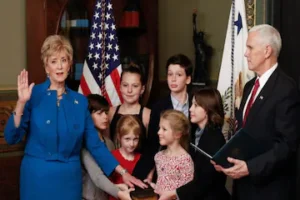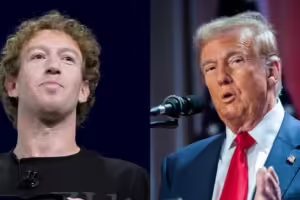How Liz Cheney tried to give GOP women permission to vote for Harris

Republican female voters have the liberty to support Kamala Harris without feeling obligated to disclose their choice to anyone.
Liz Cheney’s recent tour through swing states alongside the vice president highlighted a significant observation: the staunch conservative and ex-congresswoman constructed a framework of empowerment, granting suburban Republican and independent women the freedom to reject Donald Trump and instead support the Democratic candidate.
After the significant ruling by the Supreme Court in 2022, the mother of five, previously known for her strong anti-abortion stance during her time as a lawmaker and for celebrating the overturn of Roe v. Wade, expressed concerns about the inadequate access to essential reproductive health services for women. She highlighted Vice President Harris as the only one with the empathy to address this pressing matter.
In Waukesha County, a pivotal area near Milwaukee, Cheney reiterated her stance against abortion while expressing profound concern about the developments in various states. She highlighted the distressing situations where women faced barriers to essential medical care due to providers fearing legal repercussions, leading to tragic outcomes as acknowledged by the vice president.
She mentioned that the current situation is one that she believes to be unsustainable.
In the third event of the day where Cheney and Harris engaged, following previous stops in Pennsylvania and Michigan, Cheney presented a broader argument against the Republican nominee, surpassing the scope of criticism voiced by the vice president herself.
Cheney, situated in a Detroit suburb, observed that a number of Republicans harbored anxieties about potential repercussions, including violence, if they openly opposed Trump. Speaking alongside Harris, Cheney offered a gentle reminder, suggesting that individuals could follow their conscience by voting without feeling the need to disclose their choice to others. She anticipated that come November 5, numerous Republicans would opt for this discreet approach.
Cheney had been rapidly ascending within the GOP ranks before she faced the consequences of publicly criticizing her party’s protection of Trump following the US Capitol attack on January 6, 2021. Subsequently, she lost her position as House GOP conference chair and was defeated by a pro-Trump opponent in the 2022 primary election for her Wyoming seat.
While standing next to Harris, her presence indicates that she remains committed to principled politics despite experiencing a loss of power. This also underscores a crucial aspect in the remaining days of the general election campaign: Harris’ ability to attract a substantial Republican following.
Potential Reasons Trump Could Seek Assistance from Haley
The Harris campaign is reaching out to Republican voters who are disillusioned with Trump’s erratic and crude conduct, concerns about constitutional integrity, and tendency to cozy up to authoritarian figures, which alarms the hardliners of the Bush and Reagan eras — even including Dick Cheney, the father of former Vice President Cheney.
It’s possible that some of these voters could be among the many Republicans who supported former South Carolina Governor Nikki Haley in the primary race against Trump earlier this year. Trump has hinted at the idea of joining forces with Haley to attract these voters. If Harris manages to sway even a small number of these voters away from Trump, especially in crucial swing states with narrow margins, it could make a significant difference.
Cheney’s collaboration with Harris is imperative as bridging the gap with dissident Republican voters requires a delicate approach, urging them to set aside deeply held political beliefs. Harris could greatly benefit from Cheney’s significant influence on certain voter demographics, owing to her staunch conservative principles and unwavering defense of core American values.
Cheney, the vice chair of the House select committee probing January 6, emphasized the importance of conservatism and loyalty to the Constitution during a speech in Chester County, Pennsylvania, near Philadelphia. She pointed out the crucial decision voters face in the upcoming race: supporting a candidate committed to upholding the Constitution or endorsing Donald Trump, whose past actions, especially after the previous election and on January 6, speak volumes about his approach to governance.
A stark warning on women’s health care
Cheney expressed concerns about the Constitution that echoed familiar sentiments. Particularly striking were her comments regarding the potential repercussions following the Supreme Court’s decision to overturn the federal constitutional right to abortion, a decision influenced by the conservative majority appointed by Trump.
Cheney has not abandoned her long-standing anti-abortion stance. However, she brought up conversations about the Texas attorney general’s potential lawsuit over women’s medical records. She also seemed to criticize conservative lawmakers and officials whose strict measures have led to the shutdown of crucial healthcare services. As a result, some women have been denied necessary emergency abortions or other essential reproductive healthcare when their lives were in jeopardy. Earlier this year, Democrats also drew attention to the suspension of IVF treatments in Alabama following a state Supreme Court decision declaring frozen embryos as human beings, with repercussions for those who destroy them. Although the state’s Republican governor later enacted a law to safeguard IVF patients, Democrats point to this case as indicative of the disorder and erosion of rights they attribute directly to Trump.
Cheney, little did she expect her lengthy comments to create a buzz, was open to discussing this matter. In Pennsylvania, she stepped in during the conversation following Harris’s mention of the topic. Moreover, she expressed her views subsequent to the vice president’s commitment to endorse a legislation reestablishing the universal entitlement to abortion in case she assumes the presidency and the legislative body approves it.
Cheney’s stance on the matter indicated a strategic move by the Harris team, recognizing her significance in appealing not just to Trump’s authoritarian tendencies and democratic risks but also in connecting with numerous Republican women, notably in pivotal swing-state suburban areas. These women might adamantly oppose abortion while also being wary of measures that could jeopardize their healthcare.
Cheney’s recent joint appearances with Harris are part of the vice president’s efforts to significantly increase the existing gender disparity in support compared to the former president, specifically among female voters. According to a recent poll conducted by The New York Times and Siena College, Harris is currently leading with a 16-point margin over Trump among women voters, with 56% in favor of her compared to 40% for Trump. On the other hand, Trump is ahead among male voters by 11 points, with 53% supporting him versus 42% for Harris.
The ex-president has faced challenges in handling discussions on abortion and connecting with female voters in the ongoing campaign. He eagerly takes credit for the significant Supreme Court ruling while trying to evade its political repercussions. False claims have been made by him, asserting that all women were content with the ruling. In an attempt to appeal to female voters, he has audaciously vowed to act as their “protector” if he regains the presidency. Moreover, in a peculiar statement at a recent town hall exclusively attended by women, he oddly referred to himself as the “father” of IVF.
Challenges Faced by Trump in Winning Over Female Voters
Harris’ interactions with Cheney have sparked inquiries regarding the potential Republican voter demographic she could appeal to. In a survey conducted by The New York Times, it was revealed that 9% of probable Republican voters were considering supporting her, while only 3% of Democrats indicated a willingness to vote for Trump. Should this trend persist into the upcoming election in November, it could pose a substantial hurdle to Trump’s re-election prospects. However, amidst the prevailing societal division, uncertainties linger regarding the likelihood of a substantial shift of Republican voters or conservative-leaning independents towards the Democratic candidate.
The potential dangers seem to be acknowledged by the Trump campaign. During his visit to Philadelphia, the ex-president mentioned that Haley expressed interest in accompanying him on the campaign trail. Moreover, CNN disclosed that discussions had taken place between the campaign and the former governor of South Carolina regarding her potential debut alongside Trump. In recent times, Trump has organized events specifically aimed at engaging female voters, with appearances from figures like his former White House press secretary, Arkansas Governor Sarah Huckabee Sanders.
Over the weekend, Trump’s erratic behavior and inappropriate remarks about late golfer Arnold Palmer’s physical attributes might have further alienated women voters and disenchanted Republicans. Nevertheless, these unpolished political tactics could potentially solidify his authenticity among his steadfast supporters.
Kristen Soltis Anderson, a Republican pollster, expressed concern about Trump’s impact on the party, stating that some Republicans find it difficult to support a candidate associated with Trump’s influence. She highlighted the existence of individuals who may not be politically inclined but find humor in such situations, acknowledging their presence within Trump’s support base.
An additional goal of Trump’s team was to tap into another aspect of his popularity while trying to undermine Cheney. Highlighting that her father played a significant role in the Iraq and Afghan wars during the Bush administration, the former president emphasized how these conflicts led to widespread war-weariness and ultimately contributed to his own ascent in politics.
Trump critiqued Dick Cheney as a RINO who is inconsequential, just like his daughter. He went on to include Harris in a group he deemed as proponents of “Endless Nonsensical Wars” that not only squander lives but also incur trillions of dollars in expenses, all shared on Truth Social.
The exclusion of the Cheneys from the GOP during the Trump era highlights the significant overhaul the party underwent under the former president’s leadership. Following the election, only a single faction within the Republican Party’s family divide will find satisfaction.














